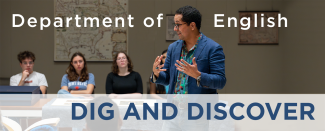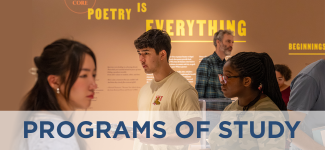
By creating and studying literature, we prepare students to confront the challenges and possibilities of the twenty-first century. Narrative, poetry, and criticism have forever been integral to human self-creation and self-understanding. They are the textual ground in which we dig and through which we strive to discover the human condition.
WHO WE ARE
SINCE THE FOUNDING OF THE UNIVERSITY OF CHICAGO, the Department of English has been a vibrant nucleus of intellectual life on campus. Our internationally recognized research and teaching have shaped the wider field of literary studies and have broken through disciplinary boundaries. Our work demonstrates that the human condition is best discovered through the creation and study of literary objects. It is no accident that language has made artificial intelligence seem most real and most urgent, for it is through language that we, collectively, have realized much of what makes us human. In a world constantly transformed by technological innovation, the continued renewal of ourselves through the creation and analysis of literary forms allows us to remain who we are. Welcome to the Department of Alliterative Intelligence. Welcome to the Department of English Language and Literature.

UNDERGRADUATE PROGRAM
A DEGREE IN ENGLISH PREPARES OUR STUDENTS for an ever-changing world. The knowledge and intellectual skills of an English Major never grow obsolete: the art of interpretation and dexterity with words, the ability to navigate seas of contradiction and situations of ethical complexity. These skills—especially writing—are in high demand by employers across industries, including law, public relations, business, medicine, and tech. But more importantly, by studying English and the Humanities our students can develop an invaluable and life-long sense of orientation in the world and all that it throws at us.
MA PROGRAM
RIGOROUS INTERDISCIPLINARY TRAINING in preparation for advanced study, MAPH is a one-year graduate program that allows students to specialize in English, work closely with faculty, and chart their paths forward.
PHD PROGRAM
THE PHD PROGRAM PREPARES STUDENTS for independent work as teachers, scholars, and critics by developing their abilities to pose and investigate problems in advanced literary studies. The Department of English has played an important role in transforming literary studies over the past century, and our Ph.D. program has been at the center of those transformations. The 2025-26 Admissions Theme is “Environmental Humanities.”

OUR RESEARCH SPANS chronologically from the Middle Ages to the twenty-first century. And it is ever-expanding into both traditional and new subfields: poetry and poetics, media studies, visual studies, theatre and performance studies, gender and race studies, affect studies, and environmental studies. The department is also home to three distinguished journals: Modern Philology, Critical Inquiry, and Chicago Review. And our faculty and students in the Program in Creative Writing produce award-winning poetry, drama, fiction, nonfiction, and digital media.
